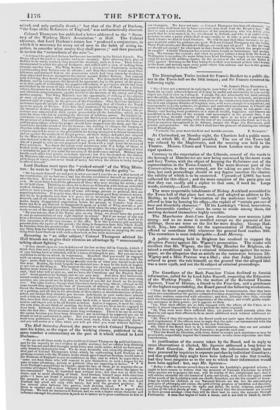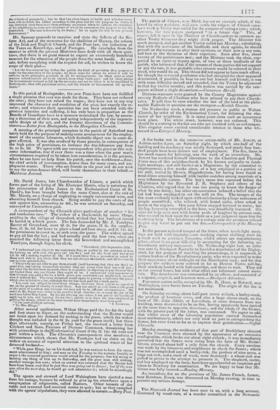The Guardians of the Bath Poor-law Union declined to furnish
information, called for by Lord John Russell, respecting the Education of the Working People. On the motion of the Reverend Thomas Spencer, Vicar of Hinton, a friend to the Poor-law, and a gentleman of the highest respectability, the Board passed the following resolutions.
"That the Board respectfully inform the Poor.law Commissioners, that they have taken into consideration the queries submitted to them respecting the number of schools and other matters connected with education ; anal that, although they fully coincide ith the Commissioners as to the importance of the subject, anal would gladly rendet any assistance in their power; yet it appears to them "1st, That their officers are so fully engaged with the affairs of the Union as to render it almost impossible for them to perform the ditties required. "2d, That even were there sufficient time, yet justice would scarcely allow the Board to call upon their officers to do so much additional woilt without additioual re- muneration. "3d, That if they did require it, the Board could not insist upon their obedience to such rerpirement, if the officers were to reply that the order vas unconnected with the duties which are imposed upon them by the new Poor-law. 4th, That if the Board were to MC a suitable remuneration, they are not satisfied that they have any right, out of the Poor-rates, to provide such sum.
"That the Board do, therefore, with every desire to reader such assistance as may be practicable, respectfully request'the Commissioners to take these objections into their consideration.
In justification of the course taken by the Board, and in reply to some observations it elicited, Mr. Spencer addressed a long letter to the Bath Guar&an. He admitted that the information might have been procured by inquiries in separate parishes by individual Guardians; and that probably they might have been induced to take that trouble, had they been sanguine as to the use to which their information would have been applied: but, says Mr. Spencer- " Before I offer to devote several days to assist his Lordship's projected sclwme. I ought to have reason to believe that the measure of National Education fur whirls these queries are to prepare the way, will be worthy of this enlightened age ; that it will neither resemble the old lumber of Latin and Greek, with which the upper rooms of the youth of his Lordship's rank are chiefly furnished, nor the few crumbs of know- ledge on which the children in our National Schools are fed, but the soul-enlarging principles of philosophy and science, the spirit sliming progress of invention avd discovery. and every thing which concerns the rights and duties, the moot, religious, and patted wetfisre of the whole family of man. I ought to know that the Government are sincere In their present attempt—that they will do their best to carry the measure through Parliament. A man that begins to build a house, and is not able to finish it, incur* the ridicule of passers.by ; but he that has often begun to build, and who has Ito or been able to finish his edifice according to the plan and for the perprse for is Inch it was intended, must have more than ordinary assurance when lie solicits the attention of his neighbours to some new structure of which he announces his put pose to lay the foundation. ' The tree is known by its fruits ;' let us apply the test to our present Government."
Mr. Spencer proceeds to examine and state the defects of the Re- form Act, and of the measures for the abolition of Slavery, the reform of the Irish and English Church, and the Poor-law, the reduction of the Taxes on Knowledge, and of Postages. He concludes from the manner in which the present Ministers have dealt with all these ques- tions, that there is no great reason to expect an extensively beneficial measure for the edeication of the people from the same hands. At any rate, before complying with the request for aid, he wishes to know the scope of their plan-
e Let the Government lay before the piddle the kind of provision they propose to make for the education of the people; let them state the extent to which it will be catholic in its principles, generous in all its arrangements; let them state in what manner schoolinabters are to be elected, from what funds pail. and let them pledge the Government to stand or rail by the measure, and not to allow it to be mutilated in Parliament ; then will patriotism revive. and the friends of Government lift up their heads."



























 Previous page
Previous page